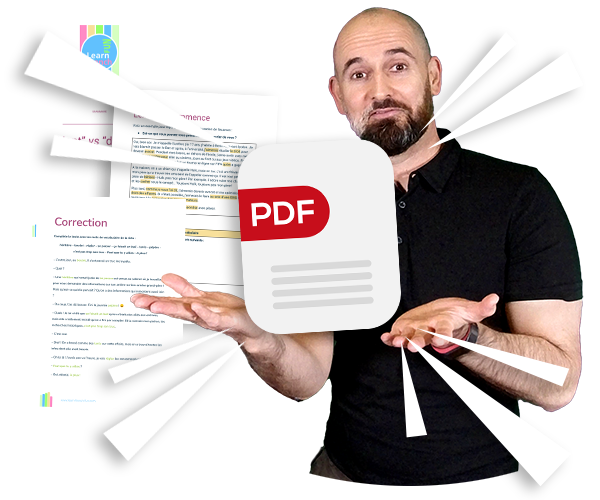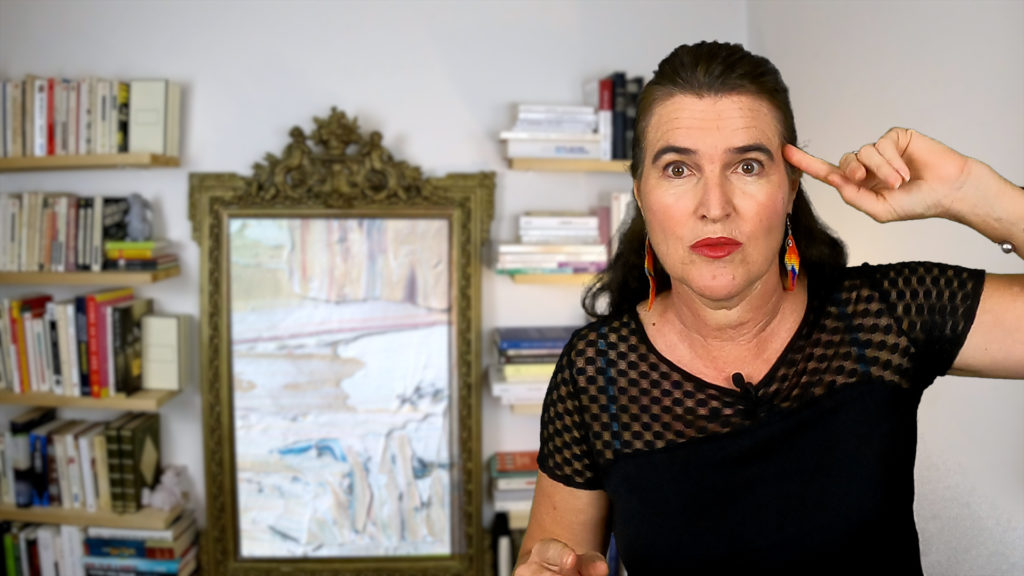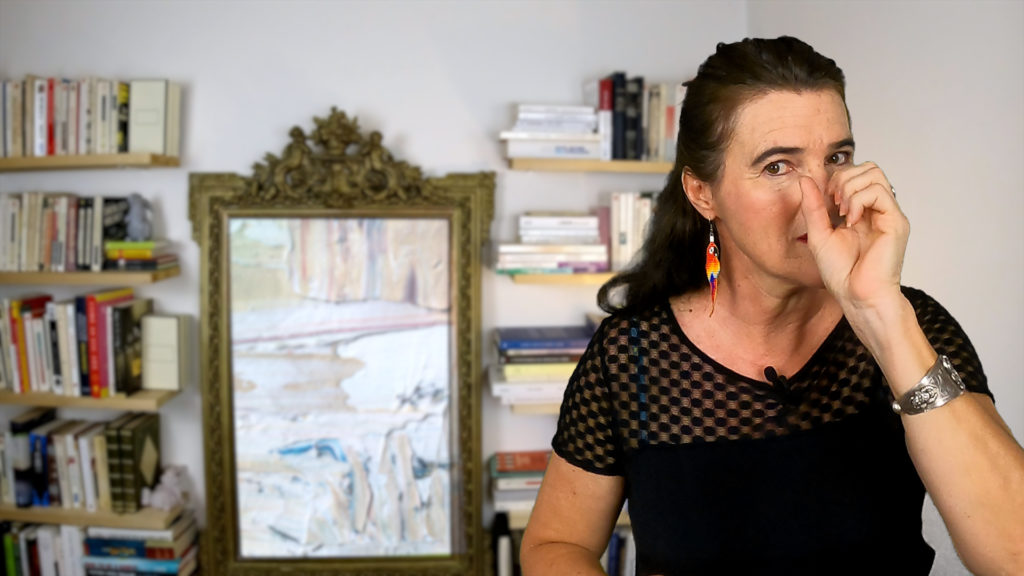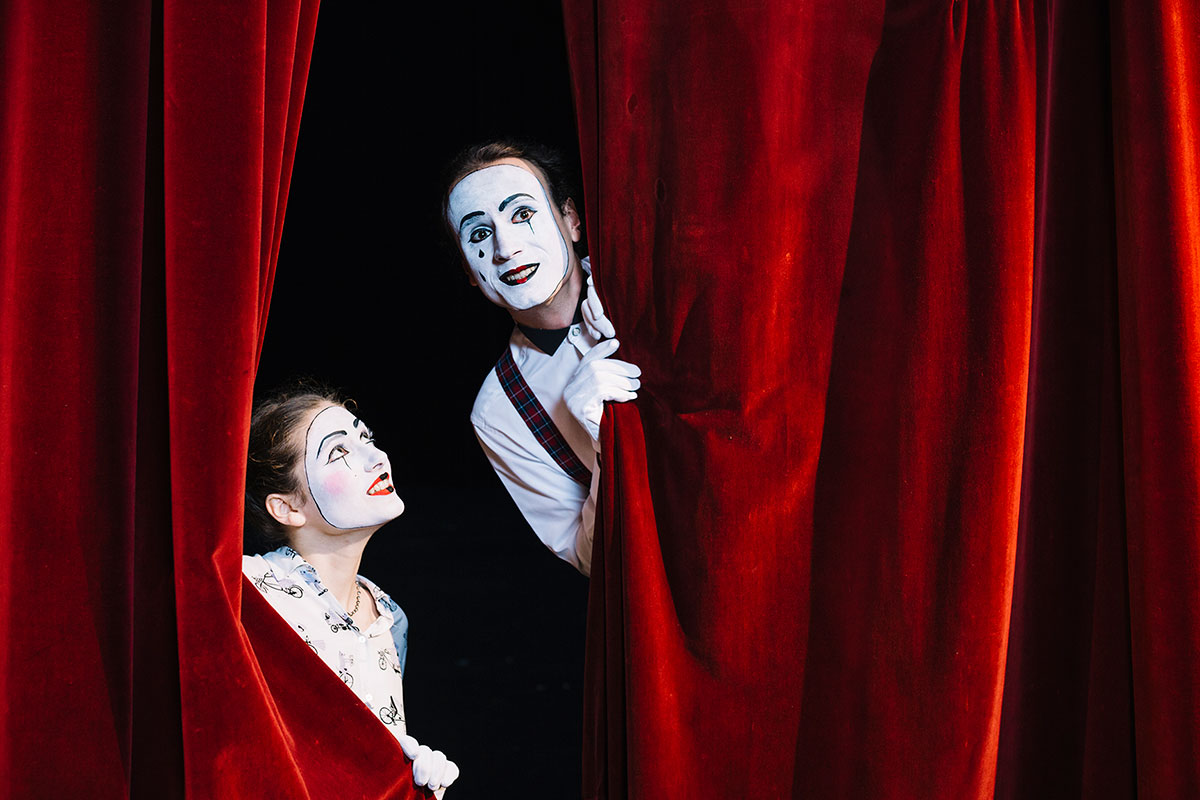So, you’ve been studying French for a while and feel like you’re ready to take your skills to the next level by conversing with native speakers. But, before you can do that, you need to know how to understand all of the gestures and mimics that they use!
- Some French vocabulary!
- The gestures of the French
- 1. être fou (be crazy)
- 2. être énervé(e) (be upset)
- 3. être ivre (be drunk)
- 4. partir (go to)
- 5. se taire (be quiet)
- 6. se taire (be quiet): alternative
- 7. en avoir assez (be fed up)
- 8. ne pas croire (not to believe)
- 9. porter chance (bring luck)
- 10. porter chance (bring luck): alternative
- 11. avoir peur (be afraid)
- 12. super (great)
- 13. Comment les Français comptent sur leurs doigts (How the French count on their fingers)
- 14. Oh là là (Oh dear)
- 15. comme ci, comme ça (like this, like that)
Lucky for you, I’m here to help. In this post, I’ll teach you about some of the most common French gestures and explain what they mean. Stay tuned – it’s going to be fun! 🙂

PDF Bonus
We have prepared a free PDF to help you understand and master the gestures and mimics of the French.
👉 Download it for free
At the end, you will have exercises to practice with the correction. 👍
Some French vocabulary!
Faire un geste (ou un signe): is to express something with your body, with your hands.
Faire une mimique: is to communicate a feeling with his facial expression, with the movements of his face.
Une interjection: it is a small invariable word which expresses a feeling, an order, a spontaneous emotion:
- aïe expresses pain, suffering,
- allo is the trigger for a phone conversation,
- chut is an interjection to ask for silence.
Une onomatopée: it is an invariable word that imitates a sound, a noise.
- Miaou is the onomatopoeia for the noise a cat makes,
- atchoum is the onomatopoeia used when someone sneezes.
- Tic-tac imitates the sound of a mechanism, a watch, a bomb about to explode.
💡 Interjections and onomatopées are widely used in comics… And are also found in the mouth of the French.
| 📌 NON-VERBAL COMMUNICATION DIFFERS FROM COUNTRY TO COUNTRY In Germany, for example, one of the most commonly used gestures is the following: you pass your hand in front of your face several times, with an annoyed or disgusted expression. This gesture does not mean anything in France, nor in Italy, nor in England, nor… It is a gesture that is used exclusively by German speakers when they want to say: You are completely crazy, you are crazy!! |
The gestures of the French
For each expression, I will give you a description of the gesture in the caption of the picture.
You will also find a list of expressions used with the gesture. Some belong to the familiar register, others to the standard register.
Do you like learning French with videos?
Receive our free video newsletter every Friday in your e-mail box. You will get 3 “Tips & Tricks” on grammar, vocabulary, phonetics or French culture.
👉👉 Sign up now!
1. être fou (be crazy)
The gesture

A bit of lexicon:
- il est fou, elle est folle,
- il/elle est malade, c’est un grand malade, une grande malade,
- il/elle est ouf. Ouf, that’s verlan. (colloquial language)
The verlan? What is it? Do the French really speak it?
👉 YouTube video on verlan - il/elle est zinzin, (colloquial language)
- il/elle est dingue, (colloquial language)
- il/elle est fada (colloquial language).
2. être énervé(e) (be upset)
The gesture

A bit of lexicon:
- Il/elle est énervé(e),
- Il/elle est en colère,
- Il/elle est furieux, furieuse,
- Il/elle est véner. Véner, that’s verlan. (colloquial language)
- Il/elle a les boules. (colloquial language)
3. être ivre (be drunk)
The gesture

A bit of lexicon:
- Il/elle est ivre,
- Il/elle est saoul, saoule,
- Il/elle est bourré(e), (colloquial language)
- Il/elle est beurré(e), (colloquial language)
- Il/elle est pété(e), (colloquial language)
- Il/elle est schlass, (colloquial language)
- Il/elle est bleu(e). (colloquial language)
4. partir (go to)
The gesture

A bit of lexicon:
- Il/elle part (partir), (colloquial language)
- Il/elle s’en va (s’en aller), (colloquial language)
- Il/elle se casse (se casser), (colloquial language)
- Il/elle se tire (se tirer), (colloquial language)
- Il/elle se barre (se barrer). (colloquial language)
5. se taire (be quiet)
The gesture

A bit of lexicon:
- Il/elle se tait (se taire),
- Il/elle garde le silence,
- Il/elle arrête de parler,
- Il/elle la boucle, (colloquial language)
- Il/elle ferme son bec, (colloquial language)
- Il/elle ferme sa gueule. (⚠️ vulgar)
6. se taire (be quiet): alternative
The gesture

A bit of lexicon:
- Motus et bouche cousue : this expression is used less to order someone to keep quiet than to ask them to keep a secret that I have entrusted to them.
7. en avoir assez (be fed up)
The gesture

A bit of lexicon:
- Il/elle en a assez,
- ça m’énerve !
- ça me gonfle ! (colloquial language)
- ça me gave ! (colloquial language)
- Il/elle en a marre, (colloquial language)
- Il/elle en a par dessus la tête, (colloquial language)
- Il/elle en a ras-le-bol. (colloquial language)
8. ne pas croire (not to believe)
The gesture

A bit of lexicon:
- Il/elle ment (mentir),
- Il/elle me dit des mensonges,
- Il/elle ne dit pas la vérité,
- Je ne le/la crois pas,
- Mon œil ! (colloquial language)
- Il/elle me raconte des salades, (colloquial language)
- C’est du pipeau. (colloquial language)
9. porter chance (bring luck)
The gesture

A bit of lexicon:
- Je touche du bois.
The French associate gesture with speech: they will say je touche du bois (I touch wood) and tap their hand on a piece of wooden furniture.
But as there is often more plastic than wood in our society, they will make the same gesture, but by tapping their forehead with their hand.
In fact, they have a hard head, a wooden head… So, it will have the same value as knocking on the living room table!
10. porter chance (bring luck): alternative
The gesture

A bit of lexicon:
- Je te souhaite bonne chance,
- Bonne chance !
- J’espère que ça va marcher,
- Je croise les doigts pour toi,
- Je te dis merde. (⚠️ vulgar)
⚠️ The expression “Je te dis merde” belongs to a vulgar language level.
However, it is very much used by the French, because wishing someone luck may bring him bad luck!
On the other hand, saying Merde to someone is supposed to bring him luck…
Strange superstitions of the French! 😂
11. avoir peur (be afraid)
The gesture

A bit of lexicon:
- Il/elle a peur,
- il/elle a les chocottes, (colloquial language)
- Il/elle a la frousse, (colloquial language)
- Il/elle a la pétoche, (colloquial language)
- Il/elle a la trouille, (colloquial language)
- Il/elle a le trouillomètre à zéro, (colloquial language)
- Il/elle flippe. (colloquial language)
12. super (great)
The gesture

A bit of lexicon:
- C’est, Il/elle est fantastique,
- C’est, Il/elle est génial(e),
- C’est, Il/elle est extraordinaire,
- C’est, Il/elle est super,
- C’est, Il/elle est d’enfer, (colloquial language)
- C’est, Il/elle est trop bien, (colloquial language)
- C’est, Il/elle est vachement bien, (colloquial language)
- C’est, Il/elle est cool, trop cool, super cool ! (colloquial language)
13. Comment les Français comptent sur leurs doigts (How the French count on their fingers)
The gesture

A bit of lexicon:
- Zéro, un, deux, trois…
14. Oh là là (Oh dear)
The gesture

A bit of lexicon:
The expression Oh là là, and the gesture that accompanies it, are extremely rich in meaning:
- surprise,
- disappointment,
- irritation,
- admiration,
- compassion…
Everything will depend on the mimicry that the person makes and the tone in which he pronounces the expression Oh là là.
15. comme ci, comme ça (like this, like that)
The gesture

A bit of lexicon:
This gesture and the verbal expression Comme ci, comme ça are used a lot to answer the question: Ça va?
Well, no, it’s not going too well, it’s going like this, like that.
- Ça va ? Tu vas bien ? Vous allez bien ?
- Non, je ne me sens pas en forme,
- J’ai une petite forme,
- Non. Ça ne va pas fort,
- Bof, (colloquial language)
- Non, j’ai pas la pêche en ce moment ! (colloquial language)
It’s always interesting to learn about the quirks of other cultures, and French non-verbal communication is certainly no exception. By understanding a few basic gestures and mimics, you can go a long way in impressing your French friends (or just avoiding any embarrassing faux pas).
Bon voyage !
Do you have any favorite French non-verbal expressions? Let us know in the comments below.
Articles that might interest you:
- Why do French people speak English so badly?
- Grasse (the French city) World Capital of Perfumes
- French Bastille Day: July 14th
- Who are the most popular French YouTubers?
- How the bag company “I speak fluent french” has released a new collection of bags?
- French Tipping Etiquette: 10 Things Everyone Should Know
- The French and their love of coffee
- Is the French manicure really from France?
- How to understand the gestures and mimics of the French?
- French Gastronomy




1 thought on “How to understand the gestures and mimics of the French?”
Comments are closed.